Can you drink water from a water softener?
The consensus among water researchers and other scientists seems to be that soft water is perfectly safe for drinking, at least in most cases.
Most experts answer in the affirmative, though conditionally—they acknowledge that there are circumstances in which one might benefit from using harder water instead.
Such circumstances include a recent diagnosis of heart disease or hypertension, pregnancy, or nutritional guidelines that call for reduced sodium. Hard water may also be the way to go if you’ve been meaning to get more minerals in your diet.
Related Article: Hard vs Soft Water
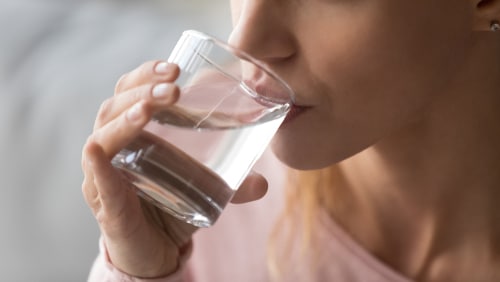
Can You Drink Soft Water?
Yes, softened water is safe for drinking.
It’s a common misconception that soft water contains salt. In reality, sodium chloride, or salt, never comes into direct contact with water as part of the softening process. Rather, softened water sometimes retains varying amounts of sodium ions as a natural side effect of chemical purification.
Ion exchange treatment, the most common form of water softening, isolates the calcium and magnesium ions in hard water and swaps them out for sodium ions. That means that the harder your water is to start with, the more sodium it will have in it once it’s successfully been softened.
But sodium and salt aren’t the same thing, and chemists and dieticians alike agree that negligible quantities of sodium generally aren’t a big deal.
How Much Sodium Is Too Much?
Based on stats provided by the not-for-profit Water Quality Association, ion exchange softening procedures leave behind roughly 8 milligrams of sodium per liter for every grain of hardness removed during treatment. That’s not nearly enough for most people to worry about.
Furthermore, the Drinking Water Inspectorate, a UK-based research group that investigates the contents and potential health impacts of treated drinking water, says that the sodium in soft water doesn’t become a problem until it surpasses 200ppm (parts-per-million).
Depending on the source and the exact type and degree of treatment, soft water can have a slightly salty taste. However, this doesn’t mean it’s dangerous or unhealthy in any way. The biggest downside of drinking soft water is that it’s devoid of health-promoting minerals.
The bottom line is that if you enjoy the taste, feel, or sense of comfort that comes with softening your water, you can continue doing so without fear of adverse effects.
When Softness Can Be an Issue
As mentioned, there may be circumstances in which drinking soft water isn’t advisable.
If you’ve been diagnosed with heart problems or hypertension, for example, it’s probably best to stick with water from harder sources.
When consumed regularly, the additional sodium present in softened water could contribute to a detrimental rise in blood pressure. The American Heart Association recommends limiting your daily sodium intake to 2,300 milligrams or less.
Similarly, sipping soft water could have undesirable consequences for pregnant women, as the underdeveloped organs of fetuses and premature babies often have a hard time filtering sodium out of the bloodstream.
Those on special low-sodium diets should also think twice before making soft water their primary source of hydration. In this case, a little extra sodium can make a big difference. The last thing you want is to fall short of your wellness goals because you were trying to follow your doctor’s suggestion to get more water.
Lastly, if you have a green thumb, you may be interested to learn that soft water may be killing your plants. Sodium is poisonous to most botanicals, so if you want your greenery to flourish, you’d be better off going with ordinary tap water or water that’s been filtered and purified through other means.
Best Uses for Soft Water
Soft water’s most useful applications lie outside drinking and cooking. More specifically, soft water can provide much better results for essential tasks like bathing, cleaning clothes, and doing the dishes.
Preserving Appliances:
Due to its abundant mineral profile, especially hard water tends to produce a chalky residue known as “scale.”
For this reason, home improvement specialists sometimes advise homeowners to use water softening solutions to prevent harmful scale buildup inside water heaters, dishwashers, coffee makers, and other important appliances.
Making the switch to soft water therefore promises to extend the lifespan of your most relied-on gadgets.
Skincare:
People with skin conditions like eczema, psoriasis, and rosacea that are characterized by persistent irritation may find that the relative gentleness of soft water feels far better on their extremities than hard water. It’s not uncommon for dermatologists to prescribe water softeners for patients with these afflictions.
Beauty and Hygiene:
The fact that soft water is free of minerals also means that it won’t cause noticeable buildup or interfere with the active ingredients in soaps, cleansers, shampoos, and other products. As such, scrubbing up with soft water can leave your skin and hair looking and feeling cleaner, smoother, and healthier.
More Efficient Cleaning:
Hard water has been shown to decrease the sanitizing power of certain soaps and detergents. While most detergents today are formulated with special additives designed to counteract the effects of hard water, soft water still has the potential to get clothes and dishes cleaner while also allowing you to use less soap.

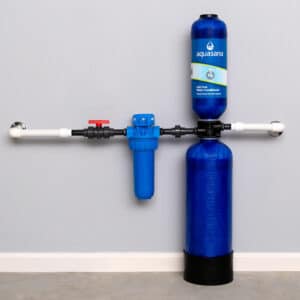

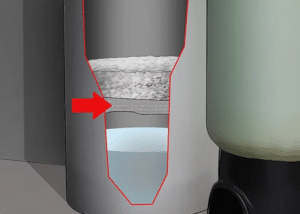
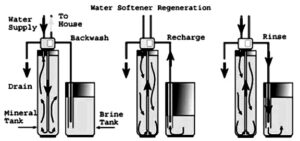
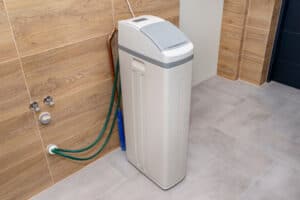
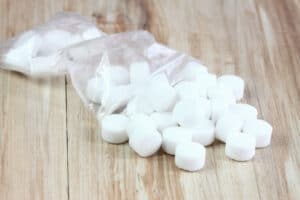
Great information here but I am afraid now I am more confused than ever. My wife and I were jsut getting serious about needing a water softner system for our whole house and really think it is a good idea. There is no doubt, the water in our area is hard water supplied by our city’s water department but it does staind sinks, tubs, toilets and I am sure harmful to our pipes. We have a brand new home (1 year now) and want to prevent any harmful impact to our house and for our health. The consueing part for us now, after reading through this site, is what about health issues? What about gardening? I have high blood pressure but controlled with medication. Will the sodium pose a threat? My wife is big into gardening, both in doors and out and we read plants don’t like the sodium content. Will an EcoWater system hurt our plants? We are both of retirement age and this home may well be the last home we build so, although budget minded, we would like to have the best solution possible moving forward. Any help or suggestions you can offer would be greatly appreciated.
We live in Conroe Texas
Thank you
Hi Kurt, thanks for the question on this topic. Yes, if you use a salt-based system, you do need to be mindful of the sodium content of the conditioned water. Both for human consumption and for watering plants in a garden, you need to consider the amount of sodium that is being consumed/used. Especially if you are on a sodium watch due to health factors, then you may want to consider using potassium chloride in your water softener instead of sodium chloride. The system will ultimately produce similar results of what you’re looking for from softened water, but will do so without the concern around consuming sodium or having sodium in the water you’re providing to your garden or plans. The only drawback essentially is that potassium will cost more than sodium to use in your system. I hope that clarifies and also gives you a simple resolution on the matter.